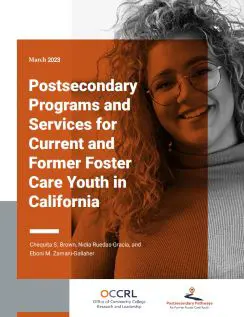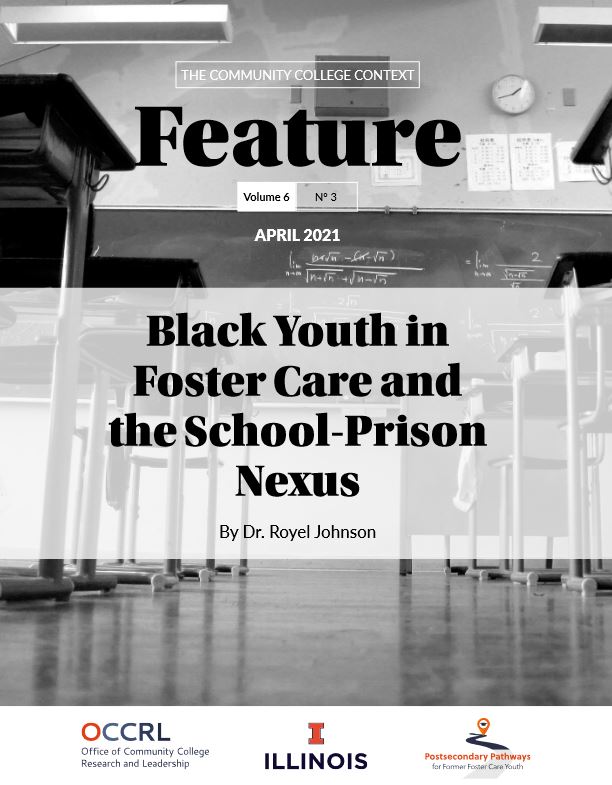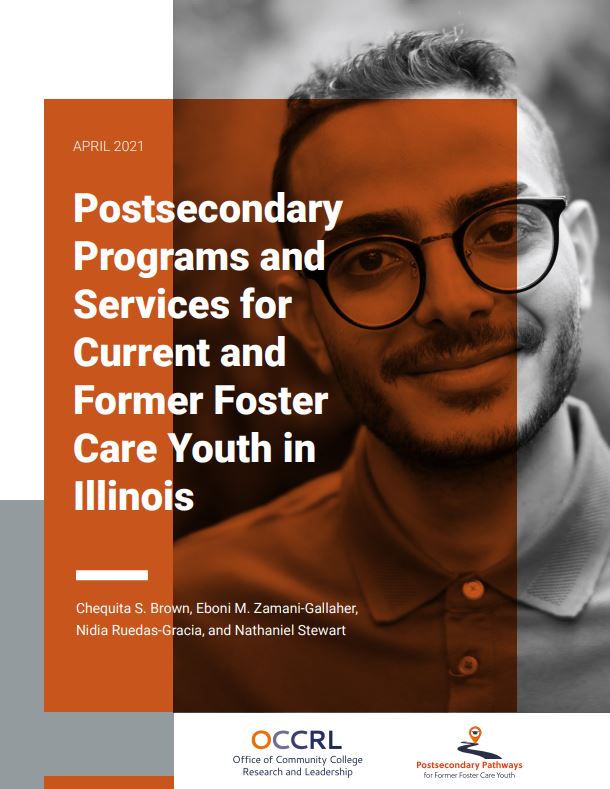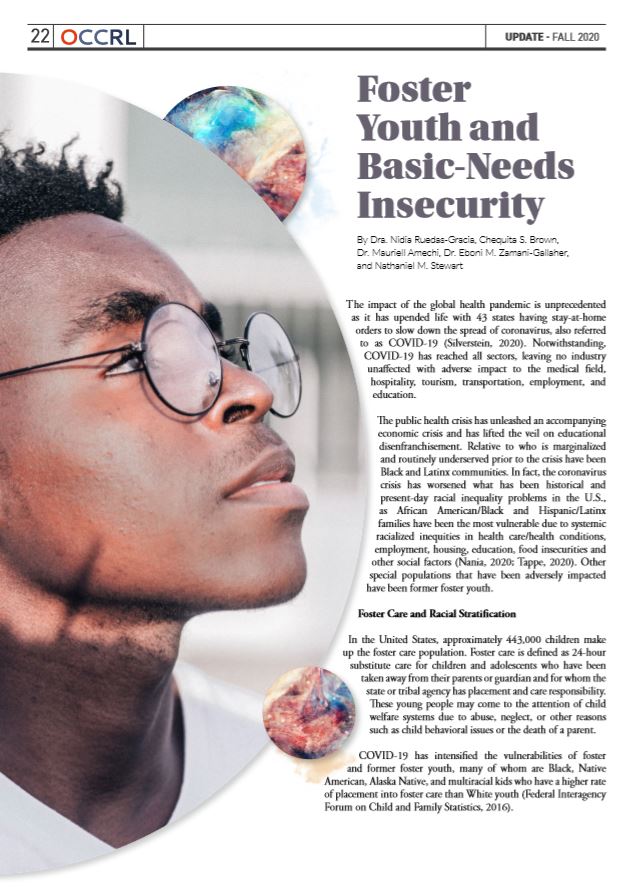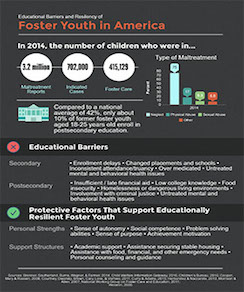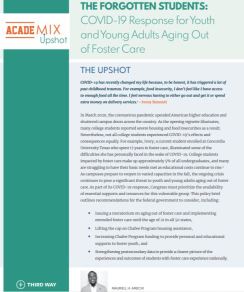
Postsecondary Pathways - for Former Foster Care Youth
This project has been completed and is no longer active.
However, we hope you are able to utilize its resources.
The Postsecondary Pathways for Former Foster Care Youth (PP-FFCY) reflects OCCRL’s commitment to examining and developing postsecondary pathways that support mobility for first-generation, underserved, and minoritized populations, as well as strengthening career pathways to promote seamless transitions from college to careers. This project endeavors to examine postsecondary access, opportunities, and supports for foster youth in Illinois and other states across the county in addressing access and outcomes of FFCY in Career Technical Education (CTE).
Purpose
The Postsecondary Education Pathways for Former Foster Care Youth (PP-FFCY) project is an exploratory study focused on postsecondary pathways for current and former foster youth in Illinois. OCCRL is conducting a comprehensive-needs assessment that provides a descriptive profile of current and former foster youth populations in Illinois; examines postsecondary access, opportunities, and supports for foster youth in Illinois; and addresses disparities in career and technical education (CTE) programs. This project reflects OCCRL’s commitment to examining and developing postsecondary pathways that support mobility for first-generation, underserved, and minoritized populations as well as strengthening and supporting career pathways to promote seamless transitions from college to careers.
Resources
OCCRL aims to increase postsecondary awareness, access, and attainment for current and former foster care youth by providing information on programs and other resources that offer holistic support and services. View the list of postsecondary programs and services.
Strategies to Cultivate a Foster-Friendly Culture on Community College Campuses
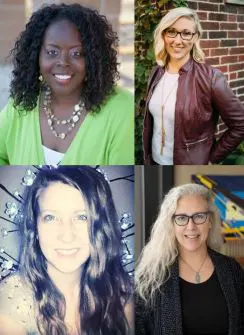 In this episode, Chequita Brown talks with Kate Danielson of the organization Foster Progress, as well as with Anna Wandtke and Tricia Wagner of Rock Valley College in Rockford, Illinois. The group discusses how to cultivate a foster-friendly culture at Illinois community colleges.
In this episode, Chequita Brown talks with Kate Danielson of the organization Foster Progress, as well as with Anna Wandtke and Tricia Wagner of Rock Valley College in Rockford, Illinois. The group discusses how to cultivate a foster-friendly culture at Illinois community colleges.
Navigating College as a Foster Care Alum
 In this episode, OCCRL research assistant Chequita S. Brown talks with Jonathan Stacy, a sophomore at Heartland Community College who is pursuing his studies and a possible career in criminal justice.
In this episode, OCCRL research assistant Chequita S. Brown talks with Jonathan Stacy, a sophomore at Heartland Community College who is pursuing his studies and a possible career in criminal justice.
Listen to the podcast and view the transcript.
Key Elements to Successfully Connecting Foster Care Youth to Educational Resources for Postsecondary Success
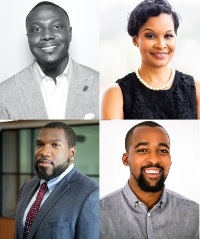 In this episode, Nathaniel Stewart talks with Mauriell Amechi, Regina Gavin Williams, and Blayne Stone Jr. about how the transitions and pathways to postsecondary education are similar and different for Black former foster care students. The scholars also discuss key elements to successfully connect foster care youth to educational resources that help advance the postsecondary education opportunities for this student population.
In this episode, Nathaniel Stewart talks with Mauriell Amechi, Regina Gavin Williams, and Blayne Stone Jr. about how the transitions and pathways to postsecondary education are similar and different for Black former foster care students. The scholars also discuss key elements to successfully connect foster care youth to educational resources that help advance the postsecondary education opportunities for this student population.
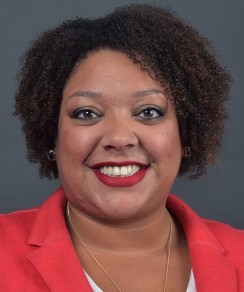
Maddy Day
The Impact of Campus-Based Support Programming on Foster Care Collegians' Postsecondary Access and Retention
In this episode, Chequita Brown of OCCRL talks with Maddy Day about the Fostering Success initiative in Michigan and the impact of campus-based support programming on foster carecollegians' postsecondary access and retention.

Patricia Palmer
How Youth-in-Care in Illinois Can Access Educational Resources to Pursue a Postsecondary Education
In this episode, OCCRL research assistant Chequita Brown continues the conversation on foster care youth by talking about with Patricia Palmer about accessing available resources in Illinois for youth-in-care who want to pursue a postsecondary education.
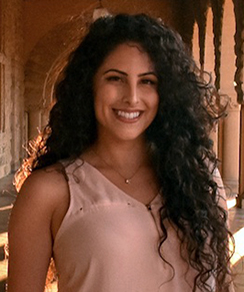
Nidia Ruedas-Gracia
Conceptualizing 'Sense of Belonging' Among Students From Historically Minoritized Racial Groups Within Higher Education
In this episode, Colvin Georges Jr., a research associate at OCCRL, talks with Dr. Nidia Ruedas-Gracia about what it means to have a sense of belonging and discusses her research in this area. They also discuss how a sense of belonging affects college students from historically minoritized racial groups.
Postsecondary Programs and Services for Current and Former Foster Care Youth in California
By Chequita S. Brown, Nidia Ruedas-Gracia, and Eboni M. Zamani-Gallaher
This brief highlights postsecondary programs and services in California that support youth in care, in addition to young adults who are aging out of foster care. Read more.
Tracking College-to-Career Pathways for Foster Youth
By Chequita S. Brown
In this OCCRL Thought Paper, Chequita S. Brown relates how tracking the data of students with foster care experience helps to recognize them as a legitimate student population. She offers recommendations on how to do this and conveys the many obstacles that can hinder the academic and career success of foster youth. Read more.
Black Youth in Foster and the School-Prison Nexus
By Royel Johnson
In this OCCRL Feature Brief, Dr. Royel Johnson argues that the foster care system, and more specifically congregate care facilities, are part and parcel to the enhancement of carceral state power. Read more.
Postsecondary Programs and Services for Current and Former Foster Care Youth in Illinois
By Chequita S. Brown, Eboni Zamani-Gallaher, Nidia Ruedas-Gracia, and Nathaniel M. Stewart
This research brief provides an overview of programs and services that helps strengthen postsecondary pathways for current and former foster youth in Illinois. Read more.
Foster Youth and Basic-Needs Insecurity
By Dra. Nidia Ruedas-Gracia, Chequita S. Brown, Dr. Mauriell Amechi, Dr. Eboni Zamani-Gallaher, and Nathaniel M. Stewart
This article discusses how COVID-19 has intensified the vulnerabilities of foster youth and former foster youth, many of whom are Black, Native American, Alaska Native, and multiracial children who have a higher rate of placement into foster care than White youth (Federal Interagency Forum on Child and Family Statistics, 2016). Read more.
(From the Fall 2020 UPDATE on Research and Leadership)
Exploring Equity in Postsecondary Education
By Heather L. Fox, Eboni M. Zamani-Gallaher
This chapter examines how postsecondary practitioners are encouraged to work collaboratively with child welfare agencies and other community-based organizations to identify and implement culturally responsive supports for former foster youth to promote early academic achievement. Read more.
The Forgotten Students: COVID-19 Response for Youth and Young Adults Aging Out of Foster Care
By Mauriell H. Amechi
This policy brief outlines recommendations for Congress to consider regarding the country's COVID-19 response, in an effort to prioritize the availability of essential supports and resources for youth and young adults who are aging out of foster care. Read more.
OER Resources Serve Needs of Underrepresented Students in Higher Education
Initiatives to create open educational resources (OER) are on the rise to offer students a better educational experience without being burdened by high tuition fees and limited by expensive textbook costs.
The Office of Community College Research and Leadership (OCCRL) recently released Fostering Access, Affordability, and Equity: A Primer on the Role of Open Educational Resources in Illinois Career and Technical Education, a report on the initiatives and value of OER at community colleges in Illinois. In the report, the authors talk about the increased cost of textbooks and its impact on students not being able to afford course materials, which affected their performance in their courses and overall well-being.
COVID-19 only added more financial and mental stress for students already struggling prior to the pandemic. In a study of 36,602 students (54 colleges and universities in 26 states; 39 two-year colleges and 15 colleges/universities), Goldrick-Rab et al. (2020) examined how COVID-19 impacted students. When colleges campuses were mandated to close across the U.S., many students lost their sense of security (jobs, housing, and meals). From one day to another, college students across the U.S. found themselves needing to find alternate shelter, which often results in hunger and homelessness.
In 2019, 60% of students attending community colleges reported struggling with housing insecurity, and 18% reported being homeless (Goldrick-Rab et al., 2020). During the pandemic, Goldrick-Rab et al. (2020) found food insecurity increasing from 42% to 56% for students enrolled at community colleges. One-third of students reported losing their job due to the pandemic. The top three racial-ethnic groups most affected in the Goldrick-Rab et al. study identified as Indigenous (74%), African American/Black (71%), and Pacific Islander/Native Hawaiian (71%). Sixty percent of the students surveyed were parenting students (Goldrick-Rab, 2020).
Although colleges and universities are reinstating in-person learning sessions in the fall of 2021, many students are still struggling to recover from the crisis of COVID-19. Food and housing insecurities were a significant economic challenge for students prior to the pandemic and have gotten worse due to the crises during the past year. As a researcher of OER initiatives and practices serving the needs of underrepresented students (e.g., first-generation, nontraditional, parenting students, mature adult learners, women of color, limited-income individuals, and racial/ethnic groups) at two-year colleges, it is evident more research is needed in this area to understand how OER benefits underrepresented students enrolled at community colleges in Illinois.
The literature published does not clearly define OER’s initiatives and report what institutions in Illinois are using OER materials and the value of these materials for students. When it comes to underrepresented populations, there is no data to support the advantages of OER helping marginalized students and students with disabilities. Community colleges serve many students of diversity with economic and special needs. If OER offers students high-quality educational experiences that enhances teaching practices, learning resources, and innovative educational policies (Creative Commons, 2020a, 2020b), then more state and federal funds need to go toward research and access initiatives to help implement policies and practices to decrease the number of students struggling financially so they can attain their credentials and have their basic needs met while pursuing an education.
References
Creative Commons. (2020a). Open education. Author.
Creative Commons. (2020b). What we do. Author.
Goldrick-Rab, S., Coca, V., Kienzl, G., Welton, C. R., Dahl, S., & Magnelia, S. (2020). #RealCollege during the pandemic: New evidence on basic needs insecurity and student well-being. The Hope Center.
Perez, M., Del Real Viramontes, J., Yeo, H. T., Owolabi, N., & Zamani-Gallaher, E. M. (2021, June). Fostering access, affordability, and equity: A primer on the role of open educational resources in Illinois career and technical education. Champaign, IL: Office of Community College Research and Leadership, University of Illinois at Urbana Champaign.
